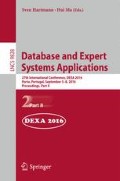Abstract
In this paper, we introduce a community detection approach from heterogeneous multi-relational network which incorporate the multiple types of objects and relationships, derived from a bibliographic networks. The proposed approach performs firstly by constructing the relation context family (RCF) to represent the different objects and relations in the multi-relational bibliographic networks using the Relational Concept Analysis (RCA) methods; and secondly by exploring such RCF for community detection. Experiments performed on a dataset of academic publications from the Computer Science domain enhance the effectiveness of our proposal and open promising issues.
Access this chapter
Tax calculation will be finalised at checkout
Purchases are for personal use only
References
Brandes, U., Delling, D., Gaertler, M., Gorke, R., Hoefer, M., Nikoloski, Z., Wagner, D.: On modularity clustering. IEEE Trans. Knowl. Data Eng. 20, 172–188 (2008)
Ganter, B., Wille, R.: Formal Concept Analysis: Mathematical Foundations. Springer, Berlin (1999)
Jay, N., Kohler, F., Napoli, A.: Analysis of social communities with iceberg and stability-based concept lattices. In: Medina, R., Obiedkov, S. (eds.) ICFCA 2008. LNCS (LNAI), vol. 4933, pp. 258–272. Springer, Heidelberg (2008)
Planti, M., Crampes, M.: Survey on social community detection. In: Social Media Retrieval, Computer Communications and Networks, pp. 65–85 (2013)
Roth, C., Obiedkov, S.A., Kourie, D.G.: On succinct representation of knowledge community taxonomies with formal concept analysis. Int. J. Found. Comput. Sci. 19, 383–404 (2008)
Rouane-Hacene, M., Huchard, M., Napoli, A., Valtchev, P.: Relational concept analysis: mining concept lattices from multi-relational data. Ann. Math. Artif. Intell. 67(1), 81–108 (2013)
Song, S., Cheng, H., Yu, J.X., Chen, L.: Repairing vertex labels under neighborhood constraints. PVLDB 7, 987–998 (2014)
Yang, J., Leskovec, J.: Defining and evaluating network communities based on ground-truth. In: ICDM, pp. 745–754. IEEE Computer Society (2012)
Acknowledgements
This work is partially supported by the French-Tunisian project PHC-Utique RIMS-FD 14G 1404.
Author information
Authors and Affiliations
Corresponding author
Editor information
Editors and Affiliations
Rights and permissions
Copyright information
© 2016 Springer International Publishing Switzerland
About this paper
Cite this paper
Guesmi, S., Trabelsi, C., Latiri, C. (2016). Community Detection in Multi-relational Bibliographic Networks. In: Hartmann, S., Ma, H. (eds) Database and Expert Systems Applications. DEXA 2016. Lecture Notes in Computer Science(), vol 9828. Springer, Cham. https://doi.org/10.1007/978-3-319-44406-2_2
Download citation
DOI: https://doi.org/10.1007/978-3-319-44406-2_2
Published:
Publisher Name: Springer, Cham
Print ISBN: 978-3-319-44405-5
Online ISBN: 978-3-319-44406-2
eBook Packages: Computer ScienceComputer Science (R0)

